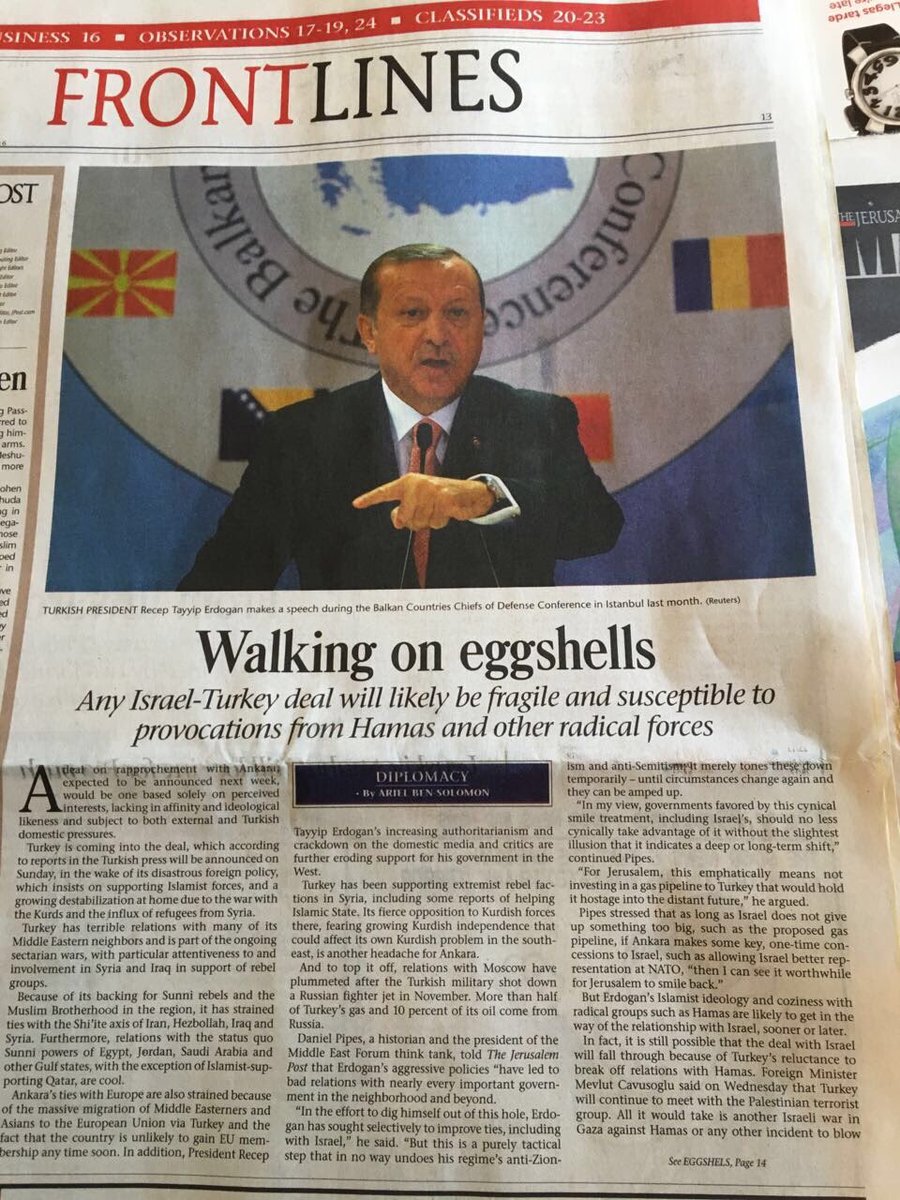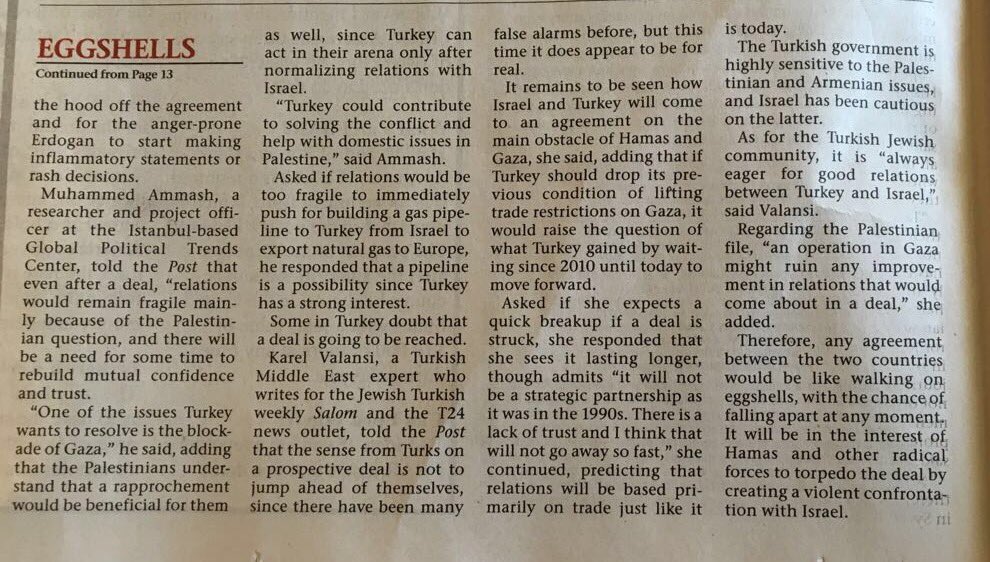A deal on rapprochement with Ankara, expected to be announced next week, would be one based solely on perceived interests, lacking in affinity and ideological likeness and subject to both external and Turkish domestic pressures.
Turkey is coming into the deal, which according to reports in the Turkish press will be announced on Sunday, in the wake of its disastrous foreign policy, which insists on supporting Islamist forces, and a growing destabilization at home due to the war with the Kurds and the influx of refugees from Syria.
Turkey has terrible relations with many of its Middle Eastern neighbors and is part of the ongoing sectarian wars, with particular attentiveness to and involvement in Syria and Iraq in support of rebel groups.
Because of its backing for Sunni rebels and the Muslim Brotherhood in the region, it has strained ties with the Shi’ite axis of Iran, Hezbollah, Iraq and Syria. Furthermore, relations with the status quo Sunni powers of Egypt, Jordan, Saudi Arabia and other Gulf states, with the exception of Islamist-supporting Qatar, are cool.Turkey is coming into the deal, which according to reports in the Turkish press will be announced on Sunday, in the wake of its disastrous foreign policy, which insists on supporting Islamist forces, and a growing destabilization at home due to the war with the Kurds and the influx of refugees from Syria.
Turkey has terrible relations with many of its Middle Eastern neighbors and is part of the ongoing sectarian wars, with particular attentiveness to and involvement in Syria and Iraq in support of rebel groups.
Ankara’s ties with Europe are also strained because of the massive migration of Middle Easterners and Asians to the European Union via Turkey and the fact that the country is unlikely to gain EU membership any time soon. In addition, President Recep Tayyip Erdogan’s increasing authoritarianism and crackdown on the domestic media and critics are further eroding support for his government in the West.
Turkey has been supporting extremist rebel factions in Syria, including some reports of helping Islamic State. Its fierce opposition to Kurdish forces there, fearing growing Kurdish independence that could affect its own Kurdish problem in the southeast, is another headache for Ankara.
And to top it off, relations with Moscow have plummeted after the Turkish military shot down a Russian fighter jet in November. More than half of Turkey’s gas and 10 percent of its oil come from Russia.
Daniel Pipes, a historian and the president of the Middle East Forum think tank, told The Jerusalem Post that Erdogan’s aggressive policies “have led to bad relations with nearly every important government in the neighborhood and beyond.
“In the effort to dig himself out of this hole, Erdogan has sought selectively to improve ties, including with Israel,” he said. “But this is a purely tactical step that in no way undoes his regime’s anti-Zionism and anti-Semitism; it merely tones these down temporarily – until circumstances change again and they can be amped up.
“In my view, governments favored by this cynical smile treatment, including Israel’s, should no less cynically take advantage of it without the slightest illusion that it indicates a deep or long-term shift,” continued Pipes.
“For Jerusalem, this emphatically means not investing in a gas pipeline to Turkey that would hold it hostage into the distant future,” he argued.
Pipes stressed that as long as Israel does not give up something too big, such as the proposed gas pipeline, if Ankara makes some key, one-time concessions to Israel, such as allowing Israel better representation at NATO, “then I can see it worthwhile for Jerusalem to smile back.”
But Erdogan’s Islamist ideology and coziness with radical groups such as Hamas are likely to get in the way of the relationship with Israel, sooner or later.
In fact, it is still possible that the deal with Israel will fall through because of Turkey’s reluctance to break off relations with Hamas. Foreign Minister Mevlut Cavusoglu said on Wednesday that Turkey will continue to meet with the Palestinian terrorist group. All it would take is another Israeli war in Gaza against Hamas or any other incident to blow the hood off the agreement and for the anger-prone Erdogan to start making inflammatory statements or rash decisions.
Muhammed Ammash, a researcher and project officer at the Istanbul-based Global Political Trends Center, told the Post that even after a deal, “relations would remain fragile mainly because of the Palestinian question, and there will be a need for some time to rebuild mutual confidence and trust.
“One of the issues Turkey wants to resolve is the blockade of Gaza,” he said, adding that the Palestinians understand that a rapprochement would be beneficial for them as well, since Turkey can act in their arena only after normalizing relations with Israel.
“Turkey could contribute to solving the conflict and help with domestic issues in Palestine,” said Ammash.
Asked if relations would be too fragile to immediately push for building a gas pipeline to Turkey from Israel to export natural gas to Europe, he responded that a pipeline is a possibility since Turkey has a strong interest.
Some in Turkey doubt that a deal is going to be reached.
Karel Valansi, a Turkish Middle East expert who writes for the Jewish Turkish weekly Salom and the T24 news outlet, told the Post that the sense from Turks on a prospective deal is not to jump ahead of themselves, since there have been many false alarms before, but this time it does appear to be for real.
It remains to be seen how Israel and Turkey will come to an agreement on the main obstacle of Hamas and Gaza, she said, adding that if Turkey should drop its previous condition of lifting trade restrictions on Gaza, it would raise the question of what Turkey gained by waiting since 2010 until today to move forward.
Asked if she expects a quick breakup if a deal is struck, she responded that she sees it lasting longer, though admits “it will not be a strategic partnership as it was in the 1990s. There is a lack of trust and I think that will not go away so fast,” she continued, predicting that relations will be based primarily on trade just like it is today.
The Turkish government is highly sensitive to the Palestinian and Armenian issues, and Israel has been cautious on the latter.
As for the Turkish Jewish community, it is “always eager for good relations between Turkey and Israel,” said Valansi.
Regarding the Palestinian file, “an operation in Gaza might ruin any improvement in relations that would come about in a deal,” she added.
Therefore, any agreement between the two countries would be like walking on eggshells, with the chance of falling apart at any moment.
It will be in the interest of Hamas and other radical forces to torpedo the deal by creating a violent confrontation with Israel.
Jerusalem Post, 25 June 2016


Yorumlar